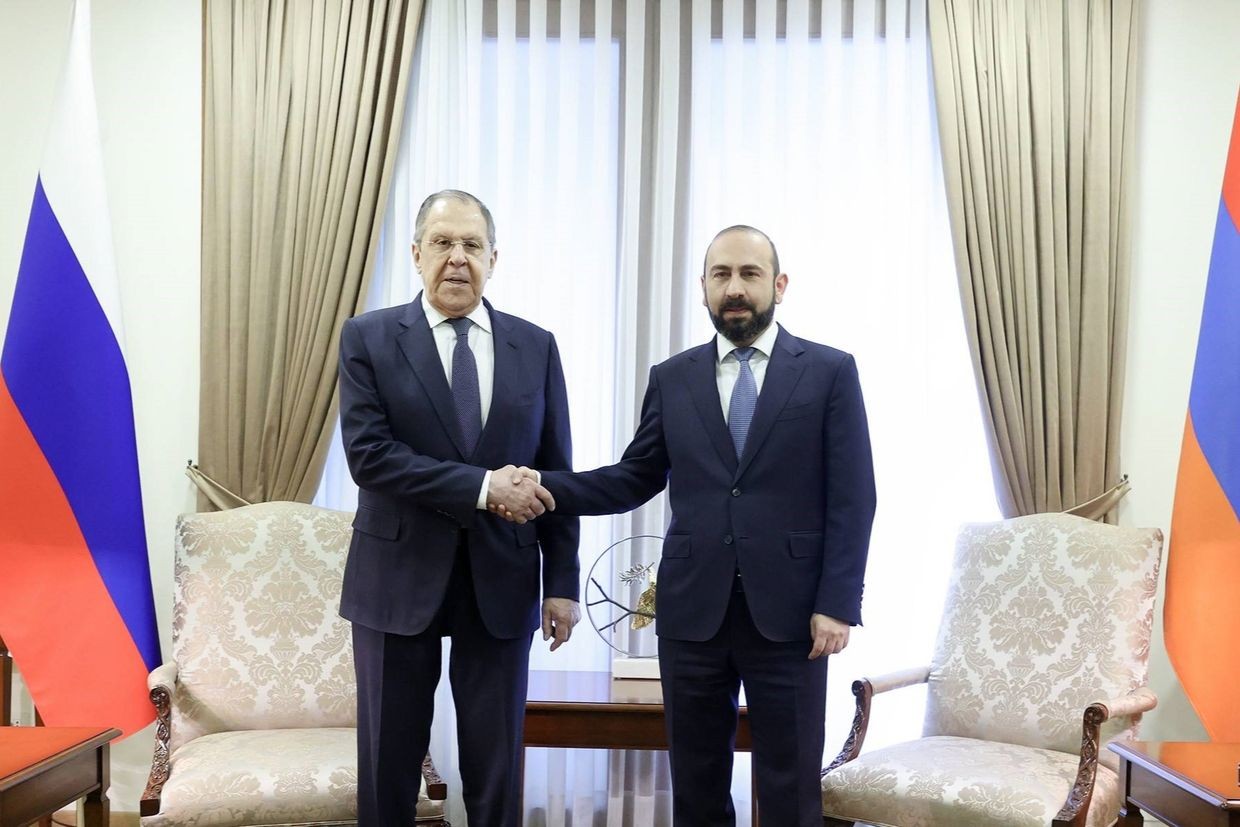
On Monday, Armenian Foreign Minister Ararat Mirzoyan responded to a statement from his Russian counterpart Sergei Lavrov, urging him ‘to refrain from interfering in Armenia’s domestic affairs and internal politics’.
Lavrov’s assessments regarding the developments around the Armenian Church were offered on Monday in a briefing following a Collective Security Treaty Organisation (CSTO) Foreign Ministers’ Council meeting.
Armenia sat out the meeting, having refused to attend other CSTO events for months, as well as pulling out from hosting a CSTO drill. In February 2024, Armenia announced that its participation in the CSTO was ‘basically frozen’.

According to RIA, Lavrov called the dispute between Armenian Prime Minister Nikol Pashinyan and the Armenian Apostolic Church Armenia’s internal affair, adding that ‘attacks on the canonical thousand-year-old Armenian Apostolic Church are a matter of grave concern’.
‘The Church has always been one of the key pillars of Armenian society, and we would very much not like this Church to be subjected to unjustified attacks without any serious grounds’, Lavrov said.
Within a week, Armenian authorities arrested two high-ranking and influential clergy for either plotting or calling for a coup in Armenia.

In his response, Mirzoyan, according to Armenpress, dismissed Lavrov’s statements, claiming that ‘there is no fight by the authorities against the church in Armenia’.
‘Perhaps Mr. Lavrov was referring to certain clergymen interfering in Armenian politics, or even to their alleged attempts — per our law enforcement — to go beyond the law, potentially participating in coup attempts’, Mirzoyan said.
Mirzoyan also urged Russian MPs and media outlets to refrain from meddling in Armenia’s internal matters.
‘They should respect Armenian sovereignty and cease interference’, Mirzoyan said.
This marks the second instance in June that Armenia has criticised Russian officials and Russian media for interfering in Armenia’s internal affairs.
Previously, following the raids at Russian–Armenian billionaire Samvel Karapetyan’s house, Kremlin propagandist Vladimir Solovyov called the Armenian government ‘corrupt, vile, worthless’, and accused it of betraying ‘the history of Armenia’.
Mirzoyan appeared to allude to Solovyov’s remarks in a statement after Karapetyan’s arrest, saying ‘there were unacceptable calls, distorted assessments, and insults — including personal ones’ being directed at the Armenian authorities.
The Armenian Foreign Ministry also communicated their position to their Russian counterpart.

However on Friday, Kremlin propagandist Margarita Simonyan, who is an ethnic Armenian and has been declared persona non grata in Armenia, claimed in a post on X that since his return from Turkey, Pashinyan, whom she referred to as ‘Effendi Pashinyan’, ‘has unleashed a campaign of smears, searches and threats against the Armenian Apostolic Church and its head Catholicos Karekin II’.
Pashinyan visited Turkey on 20 June at the invitation of Turkish President Recep Tayyip Erdoğan, where the two held a meeting.
‘To Armenians living in their homeland: what are you waiting for? For your sons to be beheaded, and your daughters to be enslaved into harems — again?’, she concluded.
Prior to the two Russian statements, on Friday, the Russian Foreign Ministry told the Russian state-run media outlet TASS, that ‘Moscow is closely monitoring the developments in Armenia, including around the Armenian Apostolic Church and its spiritual centre in Echmiadzin’.
The ministry claimed that they ‘do not have the habit of interfering in the internal affairs of other states’, and added that they were ‘genuinely interested’ in ensuring that Armenia ‘maintains stability, upholds the rule of law, and sustainable development takes place’.
‘To do this, it is necessary to put into practice the commitment to democratic values, respect for the feelings of believers, and the principles of religious freedom declared by the Armenian leadership’, the statement concluded.
Separately, unlike Russia, France appeared to support Armenian authorities in light of the disclosure of what they called ‘terrorist attacks and a coup d’état’ reportedly plotted by the Holy Struggle movement.

On Sunday, Pashinyan had a telephone conversation with French President Emmanuel Macron. According to the Pashinyan’s office readout, they discussed bilateral, regional and international issues.
In a social media post following the call, Macron noted that he had ‘expressed France’s solidarity in the face of attempts to destabilise Armenian democracy’, an apparent reference to the alleged coup attempts.










